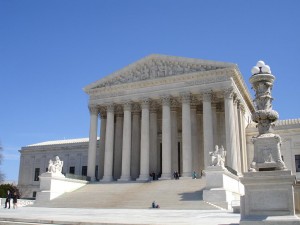 The U.S. Supreme Court started its term today, hearing oral arguments for Kiobel v. Royal Dutch Petroleum. The case involves the interpretation of a federal statute enacted by the first Congress as part of the Judiciary Act of 1879—the Alien Tort Statute.
The U.S. Supreme Court started its term today, hearing oral arguments for Kiobel v. Royal Dutch Petroleum. The case involves the interpretation of a federal statute enacted by the first Congress as part of the Judiciary Act of 1879—the Alien Tort Statute.
The Alien Tort Statute (ATS) provides that “[t]he district courts shall have original jurisdiction of any civil action by an alien for a tort only, committed in violation of the law of nations or a treaty of the United States.” The statute was all but unused until 1980, when the U.S. Court of Appeals for the Second Circuit ruled in Filartiga v. Pena-Irala that the ATS conferred jurisdiction over a lawsuit brought by a foreign national against another foreign national over actions that took place overseas. Since that ruling, the ATS has come up a handful of times, but only once previously before the Supreme Court.
In Kiobel, the case the Supreme Court heard today, twelve Nigerian nationals sued three European oil companies for helping the Nigerian government to kill and torture civilians. The case was originally filed in the U.S. District Court for the Southern District of New York, and the district court dismissed all claims against the corporate defendants, finding that the ATS imposes liability only against individuals, not corporations. On appeal, the U.S. Court of Appeals for the Second Circuit affirmed the dismissal of the claims.
The Supreme Court originally granted review in October 2011, but only as to the question whether the ATS applies to corporate conduct abroad. Shortly after hearing arguments on that issue in February 2012, the Court ordered supplemental briefing on the question whether an ATS claim could proceed when the conduct giving rise to the claim occurred wholly outside of the United States. Today’s oral argument focused on this second question.
